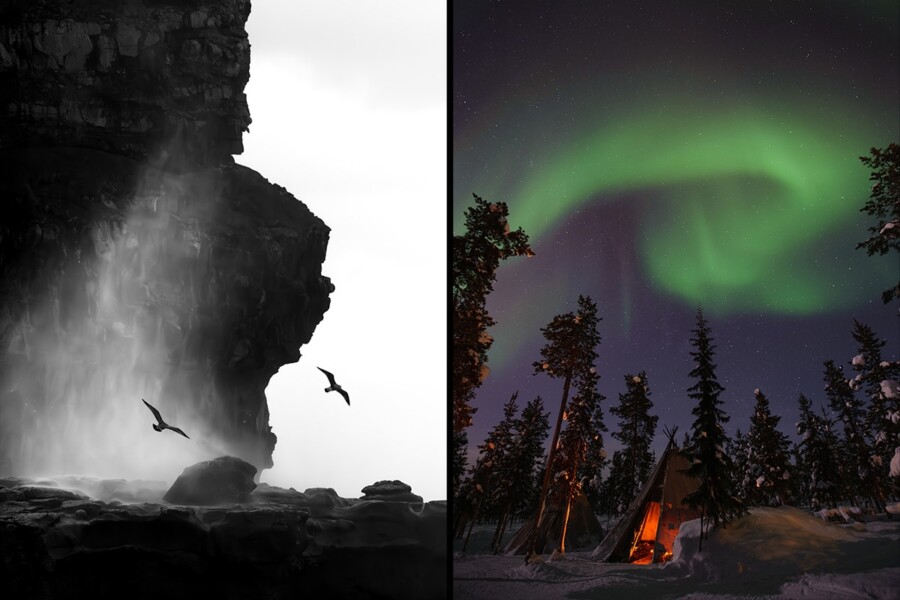Share
6 Real-Life Stories Where Photographers Were Expected To Work For Free
Photography appears to be an industry like no other. It is a magical profession that defies all rules of business and logic. A job where bills do n...
Photography appears to be an industry like no other. It is a magical profession that defies all rules of business and logic. A job where bills do not apply, and money is useless. Or, at least that’s how it seems to a large segment of the population, who expect photographers to work for free.
I simply cannot believe how many people have the balls to expect a hard-working businessperson to simply give away their goods/services for free. What other industry gets this kind of treatment?
(Check out this blog post from Aaron Hockley about the Oregon Arts Commission’s recent call for “volunteer photographers.”)
I used Twitter and Facebook to ask photographers for their own real-life stories of being asked to work for free, and I was quickly overwhelmed with more responses than I could fit into this article.
Several people shared their stories with me privately, just to vent a little of their frustration, but requested that I not share their comments in the blog. Others, as you will see below, shared them openly.
In my opinion, it’s not OK to ask anyone to work for free in any industry anywhere, including photographers – and it’s not OK to work for free. If you’re not getting money for a job, then you should be getting something of equal value (like legitimate promotion and/or marketing beyond that of a photo credit, or strategic business contacts that give you an opportunity to expand your business footprint. The point is – you, as the photographer/business owner, should make that determination, not the person asking for the freebie.)
It seems that every photographer has a story to tell. What appears below is just a small sample. I don’t know about you, but I am fascinated by these stories, and the expectation that photography –like no other profession– should be created for free.
Please contribute to this story by entering your own real experiences in the comments below. Let’s create a single page on the Internet where we can collectively send these freeloaders, and let them know that it’s not OK to ask anyone to work for free.
HUGE COMPANIES WITH MONEY ARE GUILTY TOO
You’d think that this kind of behavior would only be found in small companies who lack any sort of budget for photography. But that’s not so. The first story comes from David Scriven, a UK-based photographer. The BBC, a large publicly-funded broadcasting company that actually collects tax money from the public based on how many television sets a person has in their house.
“I received a phone call a couple of months ago from a researcher at the BBC on a Saturday afternoon football (soccer) television show. They were running a feature about newly appointed football managers for which they required a photo of a manager I had in my collection from when he first took a job at a local football club.”
“Of course I was more than willing to assist and gave the researcher a fair price for the usage they had in mind. His response was that they had a central deal with a bigger agency (Getty) and that they would not be paying for the photo. Apparently Getty were not at this particular event hence their call to me.”
“My response to that was that I had an agreement with a bigger name Satellite Television company (Sky) and as such I was not going to be paying for my Television License to fund the BBC anymore.”
“Perplexed by what had just happened the researcher and I said our goodbyes and hung up!”
“Moral of the story – we’re all in business – one way or another!”
STROKING YOUR EGO IS NOT A FORM OF PAYMENT
Now, part of the problem is that there are people who are willing to shoot pictures for free. Typically, these people are not professionals, but consider photography a hobby, and getting published, or traveling to some exotic destination is an ego-stroke form of payment.
Ed Ritger, a photographer based in San Francisco, shared a story about a company that set money aside to pay a photographer, but suddenly changed their tune once they realized that there were plenty of people willing to do the job for free.
“A (for-profit) company that arranges volunteer programs throughout Central/South America, Africa, Asia, etc is re-doing their website and branding for the business and they wanted to send a photographer to each of their spots around the world to document them and give a real sense of what the volunteering experience would be like. Sounds like a great gig, right? The advertisement went so far as to include compensation information which included all travel expenses plus a fee for the photographer. Great!”
“I applied, included what I expected to be paid, and was selected as one of three out of 150 or so applicants. They called me and invited me to come in for an interview and before we got off the phone, he said that there would be no pay for the photographer. I didn’t say much at the time, but I was pretty suspicious. I figured I would suss it out when I met with them.”
“The assignment they had in mind would be in two parts. Each would be about three weeks in length, basically self supported with nobody on the ground, no fixer, to aid in transit etc…stuff I have done before many times though. That’s six weeks of work they wanted, for free….42 days!”
“In the interview they seemed to like my proposal, my portfolio, my experience, etc, and just as we were concluding I brought up the compensation issue. I told them how it would cost me money to shoot this project for them, in lost work, no new work, insurance, equipment, etc. Not the greatest way to end an interview, but I had to say something. He wasn’t interested in discussing it then, and I probably lost the gig right then. In the end they went with someone else.”
“He didn’t really know what to expect when the ad was placed, I don’t think. And after getting a huge response, it occurred to him that he could get some p-HO-tographer to do it for free I’m guessing. “Look, we’ll give you a “free” trip, all you have to do is take amazing photos of our business that we will use to sell our products!”
“I guess this story is all too typical. It’s harder and harder to turn down any work these days, but everyone needs to have a line they won’t cross and have a sense of self-worth and professional worth. We are held to the highest of standards and expectations by our clients, why shouldn’t we hold ourselves to the same standards when negotiating a fair, or at least livable wage for our work?”
AH YES, THAT TRICK AGAIN?
Then there are those companies/people who bring you in for an assignment with a few clever tricks up their sleeves designed to save them some money. One such trick is described (below) by Robert D. Jones, a Commercial Advertising & Editorial Photographer based out of Colorado.
“The client was unaffectionately known as “The Hammer” because of the unrelenting and unrealistic demands that she placed on her employees and freelancers. To say that she was a Micro Manager is a huge understatement.”
“She was employed as the Photo Studio Manager at a former Fortune 500 Company that has since been bought by a competitor. Her previous position at the company was as the full-time Photo Assistant to the Corporate Photographer. When he was let go she took over as the Photo Studio Manager based on her time with the company. You would think that her experience in the profession would have given her an appreciation for the skills and knowledge involved in producing great photography. This was not the case.”
“Her role in this position was to manage the photography needs of the company and coordinate Freelancers to work on those projects. She was very aggressive with price negotiation and I can’t remember a project where she didn’t beat the crap out of us on price, usage and rights. She even had a “Work for Hire” arrangement with the owner of the studio I was employed by at the time for even the most basic product photography needs.”
“After the usual tough negotiation I showed up on location to do some headshots of some of their engineers. I set-up the lights and photographed the people we had scheduled and then she insisted that I photograph 2 more people for free as I was “already set-up”. I didn’t want to start an argument in front of the others who she had taken the liberty of scheduling without confirming this with us before I showed-up. I politely photographed them and thought that we would work it out after the shoot. She was quite adamant that we do it for free even when I tried to reason with her after the subjects had left the studio. She had clearly planned for me to photograph these two people for “free”.”
“Upon returning to tell my Boss about what happened he tried to negotiate with her but was not successful.”
A FREEBIE DOUBLE-WHAMMY INSULT
And then there’s the promise of “future work” as payment, or incentive. While it’s true that photographers would like to continue working into the future, if they are busy working for free all day, they’ll go broke and be unable to continue working at all.
Bastian Ehl, a photographer based in Germany, shared a story of an advertising agency looking for a double-freebie with a vague promise of future work.
“One of the bigger local agencies called to ask for a price for a corporate shoot – annual report. After having quoted the project, we met for the shoot briefing. Then they broke the news. They’re still in the pitching process and haven’t even gotten the job. So they asked for a free test-shoot to show the client their concept in the final pitching session. The ad agencies employees would serve as the models. Of course no pay for the test shoot. Plus, since all the gear [would be] already set-up, they asked for portraits of all their employees. For free as well.”
“Of course I did turn down this wonderful opportunity completely.”
ACCEPT A COMPETITOR’S GIFT CERTIFICATE?
Have you ever been asked to honor another photographers gift certificate or special offer coupon? Sounds a little crazy for one photographer to get paid for a shoot that another one does for free, right? Well, Britt Anderson, a photographer based in Savannah, Georgia had an experience just like that.
“I get clients all the time wanting to deal, but this one was the bravest.
“She had called about doing a newborn shoot, loved what I did. But also wanted maternity. Since I had only done one and was portfolio building, I offered her the free session and 10% off prints for the maternity session. Everything goes well, she orders well from the maternity, we schedule the newborn session once he was born.”
“The day before the session I get this email:”
“Britt,
“We were recently given a certificate for a free newborn session with another photographer. Having worked with you on the maternity session and considering what a great job you did I would like to work with you on the newborn photos. I wanted to see if you would be able to match this offer? I anticipate we will be purchasing many photos as well as will family and friends. Let me know your thoughts.
“I hate to put you in an awkward position however any money that we can save these days is a bonus. Thanks Britt.”
“I politely thanked her for liking my work, but would be unable to match the deal. What got me was she sought me out for my newborns specifically, was willing to pay for both the maternity and the newborn, but I politely declined the maternity because I had little experience with them.”
EXPOSURE DOESN’T PAY BILLS
The promise of “exposure” is probably innocent enough, but insulting at the same time. Sure, “exposure” can be fastastic for a photographer’s business if they will be featured in the New York Times, or have a made-for-TV movie created about their life as a photographer, but anything less doesn’t really help to expand the photographer’s business.
One such example is shared by Kike Calvo, a photographer and blogger based in Spain, who was promised “exposure” as his only form of payment.
“As I normally share with my photo students from all around Latin America, as photographers we should never give away our work for free. There are certain situations, where there is an implicit exchange, such as in search of reaching certain [new] markets. But as a whole, in my experience, when there is a monetary exchange, clients tend to appreciate our work more, like in other things in life.”
“There are many stories of people requesting freebies. From the top of my head, I can recall one request from the director of a Public Relations and Design Company. They had just launched a new office, and after a nice conversation on the phone, a lovely woman said:
“Kike, your work is beautiful. We are going to support your career. I am going to do you a favour. We are going to decorate all the walls from the company with your pictures. What do you think? This will give you exposure.”
Kike didn’t wish to publicly disclose his reply to this woman, so let’s just say that he refused the offer.
Good.
So, what can you do when you’re asked to work for free? When is it OK to work for free, and when should you only shoot if/when paid?
Read “12 Excuses for Shooting Photos for Free — and Why They’re Bogus” by John Harrington at the Black Star Rising blog.
Photography can be both fun and profitable at the same time, if only we’d stop giving it away for free.


